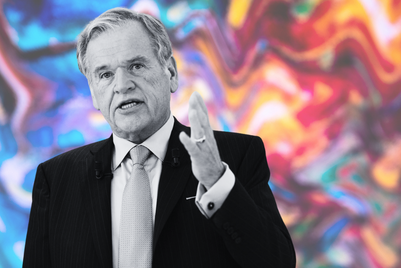
John Wren’s rare departure from his “build, not buy” strategy at Omnicom Group to purchase commerce trading platform Flywheel for $835 million seems to be a career-defining bet for the long-running chairman and chief executive.
“I’m not 30 anymore,” Wren, 71, said. “If I’m going to change the world, I’m going to have to do it quickly. I saw that this was going to put Omnicom in a position where it has a unique offering.”
Campaign US caught up with Wren in a Las Vegas hotel suite during the Consumer Electronics Show to discuss the strategy behind the Flywheel deal, Omnicom’s biggest ever acquisition which closed on Jan. 2.
Duncan Painter, the former chief executive of Flywheel owner Ascential, who has now joined Omnicom, was also in the room, alongside Jonathan Nelson, chief executive of Omnicom Digital.
The deal is a surprising move from Wren, who has established a reputation at Omnicom for building tech and capabilities from the ground up. While competitors shelled out billions on data firms, Omnicom has spent a decade building a data and technology spine called Omni powered by partnerships with major tech providers and retail media networks.
Omni enables client teams to plan, optimise and attribute campaigns in a single workflow. Its current suite of solutions are focused on the upper to mid funnel: Building awareness and consideration.
Wren’s vision to transform Omni into a “unique offering” involves plugging the “missing middle” of sales conversion.
“Everybody, Omnicon included, has been focused on the upper funnel down to the middle funnel. Some of my brighter competitors have now set up consulting practices which will tell you how to get to the rest of the funnel, but they still can’t deliver on it,” Wren said.
For this, Omnicom needed visibility into sales—data that is challenging to onboard at scale, since the holding company doesn’t always handle a client’s full product portfolio. Specialist shops dedicated to managing product sales for clients across retail marketplaces have this insight in spades. Flywheel was one of around 40 shops that Omnicom reviewed; the others “aren’t anywhere near as integrated” as Flywheel, according to Wren.
Wren asked Omnicom Digital’s Nelson if he could replicate Flywheel’s capabilities after Nelson’s visit to the commerce company’s Baltimore headquarters.
“[I said] regardless of the budget you gave me, it would take me five to 10 years to build what they already have, because it’s so extensive,” Nelson said.
“That’s what sealed my conviction,” Wren said. “Because I’m in a business that if one of my competitors goes out and does something smarter than me, I’ll recognise it, I’ll praise them and then I’ll copy it as fast as I possibly can.”
Flywheel manages sales for 50 of the top 100 consumer packaged goods products across 80 major retail marketplaces, including Alibaba, Amazon and Walmart. It claims to be the largest media buyer on Amazon, managing eight of the top 10 selling merchants on the platform.
Lucky for Flywheel, the missing two merchants are clients of Omnicom.
But this deal is far bigger than onboarding a few extra clients; Painter said the combination of Flywheel and Omni’s capabilities could transform how Omnicom plans and measures advertising spend.
“By joining up with Omni, we can translate product SKU on the retail platform back to the audience. For a lot of brands, the mystique of ‘did I get value from my spend?’ will be gone, because we'll be able to tell them whether they did or they didn't,” Painter said.
“Return on ad spend (ROAS) will be a thing of the past,” he added. “We'll be able to move the industry to a totally different set of metrics, where it will all be about what I'm spending and how I’m creating that brand presence to actually achieve outcomes and repeat purchases.”
Flywheel will operate as a standalone business unit within Omnicom, led by Painter as CEO.
All of Flywheel’s approximately 2,000 staffers will join the holding company: Wren and Painter say the deal will lead to “zero” consolidation of talent.
Operationally, Omnicom Media Group’s commerce unit. Transact, will fold into Flywheel in the U.S. but will remain a separate entity in the rest of the world. Flywheel will also cut its outsourcing contracts and use Omnicom’s outsourcing hubs in India and Colombia.
The integration of Flywheel’s product and transaction data into Omni has already begun—teams from both companies began preparing integrations prior to the deal being finalised—though the full integration “will take us through the year,” says Painter.
A marketing and sales company
Wren has steered Omnicom through various evolutions during his nearly 30-year tenure at the holding company, including adapting to the growth of search, mobile and social media.
Adding Flywheel’s retail capabilities will “transform Omnicom from being an advertising and marketing company to a marketing and sales company,” he said.
He’s confident that clients will find Omnicom’s new offering irresistible.
“I can beat anybody on a pitch if I can get the opportunity to show them not my personality and the promise of what I can do, but the tools and the capabilities that Omnicom now owns,” he said.
Better connecting ad spend and outcomes was a major theme at CES 2024: Amazon talked about how it will be able to convert ads on Prime Video into product sales on its flagship retail site; Disney unveiled new metrics and a shoppable ad format across its streaming services; and NBCUniversal rolled out an AI-powered tool that selects the ad slots across its portfolio most likely to deliver against advertiser objectives.
These media giants are also investing more in self-serve capabilities that risk encroaching on services and cutting into the budgets of agencies, which already faced a challenging 2023 due to retracted spending from technology clients. Omnicom’s organic growth slowed but remained positive in 2023, outpacing some of its rivals.
Wren believes this means agencies will have to work harder to prove their worth to clients: “When you look at my industry and what I think’s going to happen to it, you're going to have to be in a position to prove that if you spend this dollar, you're going to get back two.”


.jpg&h=334&w=500&q=100&v=20250320&c=1)
.jpg&h=334&w=500&q=100&v=20250320&c=1)
.jpg&h=334&w=500&q=100&v=20250320&c=1)



.png&h=334&w=500&q=100&v=20250320&c=1)

.png&h=334&w=500&q=100&v=20250320&c=1)



.jpg&h=268&w=401&q=100&v=20250320&c=1)
.jpg&h=268&w=401&q=100&v=20250320&c=1)



